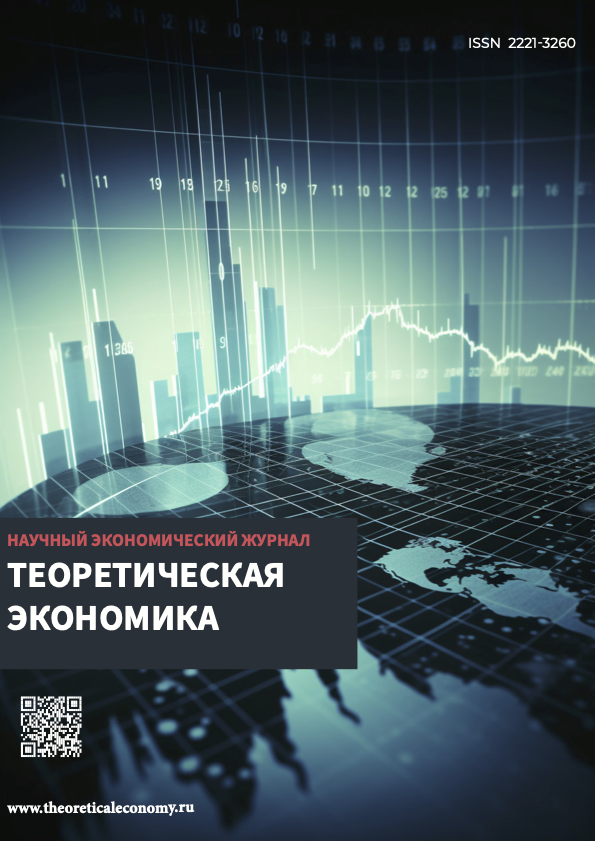Krasnoyarsk, Russian Federation
Globalization is the main trend that has defined global development over the past few decades. The current stage of globalization is characterized by high dynamics of technological development, the growth of hybrid confrontation and protectionism, which manifests itself in the technological sphere and creates risks in the field of ensuring technological sovereignty. The article is an overview of a set of indicators that allows comparing the level of technology development and ranking countries depending on their level of technological development. Significant transformations in the sphere of international relations have a multidirectional impact on the development of socio-economic systems, while the combination of factors and the nature of their influence on the development process is ambiguous. The quantitative assessment of the development of socio-economic systems and the analysis of the impact of globalization on the dynamics of this development should take into account modern trends not only in the geopolitical and economic sphere, but also reflect the features of modern technological development - the "digital revolution". The author of the article aims to analyze the dynamics of technological development of socio-economic systems of a number of countries included in the assessment group. The results of this analysis are used further in the study of the impact of globalization on the development of these systems as a whole and ranking countries depending on the level of development of their socio-economic systems. At the end of the study, the author comes to the conclusion that the main driver of technological development is technological innovations provided with the necessary production base, which allows to form the potential of technological development of the socio-economic system. The results of the study can be used to analyze the development of socio-economic systems as a whole, assess their technological potential, and develop an advisory strategy for development in the technological sphere.
globalization, technologies, digital revolution, technological development, socio-economic system, development of socio-economic systems, global transformation
1. Voloshin, A.V. Metodika ocenki urovnya razvitiya social'no-ekonomicheskih sistem i vliyaniya globalizacii / A.V. Voloshin // Ekonomika i predprinimatel'stvo. - 2021. - № 9 (134). - S. 46-50.
2. BRIKS. Sovmestnaya statisticheskaya publikaciya. 2015; Braziliya, Rossiya, Indiya, Kitay, YuAR / Rosstat. – M.: Statistika Rossii, 2015. – 235 s.
3. Rossiya i strany mira. 2020: stat. sb. /Rosstat. – M., 2020. – 385 c.
4. Rossiya i strany – chleny Evropeyskogo soyuza. 2019: stat. sb. /Rosstat. – M., 2019. – 265 c.
5. Global Financial Stability Report, April 2021: Preempting a Legacy of Vulnerabilities. International Monetary Fund. Washington, 2021. 74 p.
6. International Monetary Fund annual report 2021. International Monetary Fund. Washington, 2021. 70 p.
7. International Monetary Fund annual report 2020. International Monetary Fund. Washington, 2020. 60 p.
8. Statistical Yearbook 2021 edition. United Nations. New York, 2021. 532 p.
9. Statistical Yearbook 2020 edition. United Nations. New York, 2020. 501 p.
10. Trade and development report 2021. United nations conference on trade and development. Geneva, 2021. 161 p.
11. Trade and development report 2020. United nations conference on trade and development. Geneva, 2020. 139 p.
12. World Bank Annual Report 2021. World Bank. Washington, 2021. 122 p.
13. World Bank Annual Report 2020. World Bank. Washington, 2020. 106 p.
14. World Trade Report 2021. World Trade Organization. Geneva, 2021. 208 p.
15. World Trade Report 2020. World Trade Organization. Geneva, 2020. 204 p.
16. World Telecommunication/ICT Indicators Database 2022. International Telecommunication Union. Geneva.
17. Zombart, V. Sobranie sochineniy: V 3 t. – SPb.: Vladimir Dal', 2005.
18. Sombart, W. Deutscher Sozialismus. Charlottenburg: Buchholz & Weisswange. English translation (1937, 1969): A New Social Philosophy. New York: Greenwood, 1934.
19. Blyumin, I. G. Teoriya Dzhevonsa // Kritika burzhuaznoy politicheskoy ekonomii: V 3 tomah. – M.: Izd-vo AN SSSR, 1962.
20. Walras, M.-E.-L. Éléments d'économie politique pure, ou théorie de la richesse sociale (Elements of Pure Economics, or the theory of social wealth, transl. W. Jaffé), 1874. (1899, 4th ed.; 1926, rev ed., 1954, Engl. transl.)
21. Robinson, Dzh. Ekonomicheskaya teoriya nesovershennoy konkurencii: monografiya / Dzh. Robinson. – M.: Progress, 1986. – 472 s.
22. Veblen, T. Teoriya prazdnogo klassa / T. Veblen. –M.: Progress, 1984. – 194 s.
23. Marks K. Kapital. Kritika politicheskoy ekonomii. T.1 / K. Marks. – M.: Politizdat, 1967. – 908 s.
24. Marks K. Kapital. Kritika politicheskoy ekonomii. T.2 / K. Marks. – M.: Partizdat CK VKP(b), 1936. – 460 s.
25. Marks K. Kapital. Kritika politicheskoy ekonomii. T.3. / K. Marks. – M.: Partizdat CK VKP(b), 1936. – 784 s.
26. Marks, K. Nischeta filosofii // K. Marks, F. Engel's, sobr. soch. v 55-i t. T. 4. – M., 1955. – S. 65–185.
27. Marks K. Teoriya pribavochnoy stoimosti (IV tom "Kapitala"). Ch.1 / K. Marks. – M.: Politizdat, 1978. – 478 s.
 This work is licensed under Creative Commons Attribution-NonCommercial-NoDerivatives 4.0 International
This work is licensed under Creative Commons Attribution-NonCommercial-NoDerivatives 4.0 International










